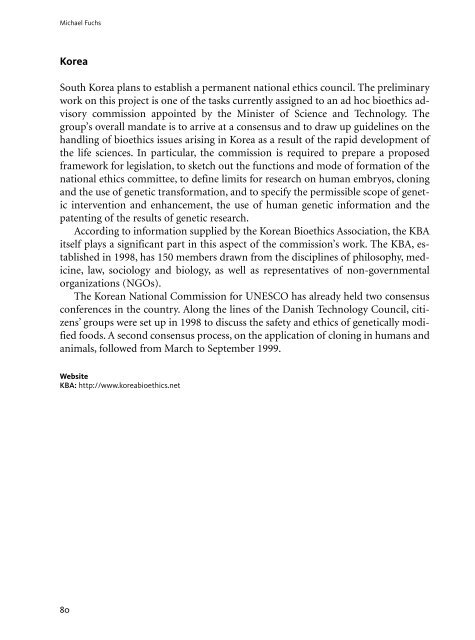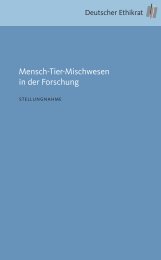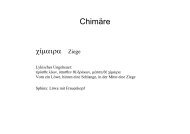Michael Fuchs National ethics councils - Deutscher Ethikrat
Michael Fuchs National ethics councils - Deutscher Ethikrat
Michael Fuchs National ethics councils - Deutscher Ethikrat
You also want an ePaper? Increase the reach of your titles
YUMPU automatically turns print PDFs into web optimized ePapers that Google loves.
<strong>Michael</strong> <strong>Fuchs</strong> <strong>National</strong> <strong>ethics</strong> <strong>councils</strong>. Their backgrounds, functions and modes of operation compared<br />
Korea<br />
South Korea plans to establish a permanent national <strong>ethics</strong> council. The preliminary<br />
work on this project is one of the tasks currently assigned to an ad hoc bio<strong>ethics</strong> advisory<br />
commission appointed by the Minister of Science and Technology. The<br />
group’s overall mandate is to arrive at a consensus and to draw up guidelines on the<br />
handling of bio<strong>ethics</strong> issues arising in Korea as a result of the rapid development of<br />
the life sciences. In particular, the commission is required to prepare a proposed<br />
framework for legislation, to sketch out the functions and mode of formation of the<br />
national <strong>ethics</strong> committee, to define limits for research on human embryos, cloning<br />
and the use of genetic transformation, and to specify the permissible scope of genetic<br />
intervention and enhancement, the use of human genetic information and the<br />
patenting of the results of genetic research.<br />
According to information supplied by the Korean Bio<strong>ethics</strong> Association, the KBA<br />
itself plays a significant part in this aspect of the commission’s work. The KBA, established<br />
in 1998, has 150 members drawn from the disciplines of philosophy, medicine,<br />
law, sociology and biology, as well as representatives of non-governmental<br />
organizations (NGOs).<br />
The Korean <strong>National</strong> Commission for UNESCO has already held two consensus<br />
conferences in the country. Along the lines of the Danish Technology Council, citizens’<br />
groups were set up in 1998 to discuss the safety and <strong>ethics</strong> of genetically modified<br />
foods. A second consensus process, on the application of cloning in humans and<br />
animals, followed from March to September 1999.<br />
Website<br />
KBA: http://www.koreabio<strong>ethics</strong>.net<br />
80<br />
Singapore<br />
One of the world’s most astonishing national <strong>ethics</strong> bodies is Singapore’s Bio<strong>ethics</strong><br />
Advisory Committee (BAC). Its foundation was closely bound up with the Government’s<br />
declared aspiration to make Singapore a leading centre of research in the biosciences.<br />
Under the Government’s programme, research and development are<br />
supposed to cover the entire range from clinical trials to the production and dissemination<br />
of healthcare services and drugs. In December 2000 the Committee was initially<br />
appointed for a two-year period to address the potential ethical, legal and social<br />
issues arising out of the intensification of biomedical sciences research. The Committee<br />
will submit its recommendations to the Life Sciences Ministerial Committee.<br />
In June 2002, the Committee published its first report: Ethical, Legal and Social Issues<br />
in Human Stem Cell Research, Reproductive and Therapeutic Cloning. Subject to<br />
certain conditions, the Committee considers research involving human embryonic<br />
stem cells to be legitimate. In particular, it calls for the establishment of a supervisory<br />
authority in accordance with the British model. The Committee’s second report –<br />
Human Tissue Research – which was devoted to tissue banks, followed in November of<br />
the same year. It too stresses the importance of a clear licensing procedure, and insists<br />
on the principle of informed consent.<br />
The Committee has a website of its own, on which the complete text of its reports<br />
can be accessed. Its electronic newsletter is also available for subscription. Published<br />
for the first time in April 2003, it reports on the work of the Committee and its Secretariat,<br />
on conferences and the like organized by the Committee and on visits from<br />
international bio<strong>ethics</strong> experts.<br />
Another Singaporean body is the Health Ministry’s <strong>National</strong> Medical Ethics<br />
Committee (NMEC). This has existed since 1994 and includes experts in medical disciplines<br />
and health policy, lay individuals and representatives of the ethnic minorities.<br />
It has published guidelines on organ and tissue transplantation, on the<br />
termination of pregnancy in the event of lethal malformations of the fetus, on the<br />
medical treatment of high-risk infants, on research on human subjects, on psychiatry,<br />
on ethical issues of gene technology (2/2001) and on financial issues in medical<br />
practice (1/2000).<br />
Website<br />
BAC: http://www.bio<strong>ethics</strong>-singapore.org<br />
81




